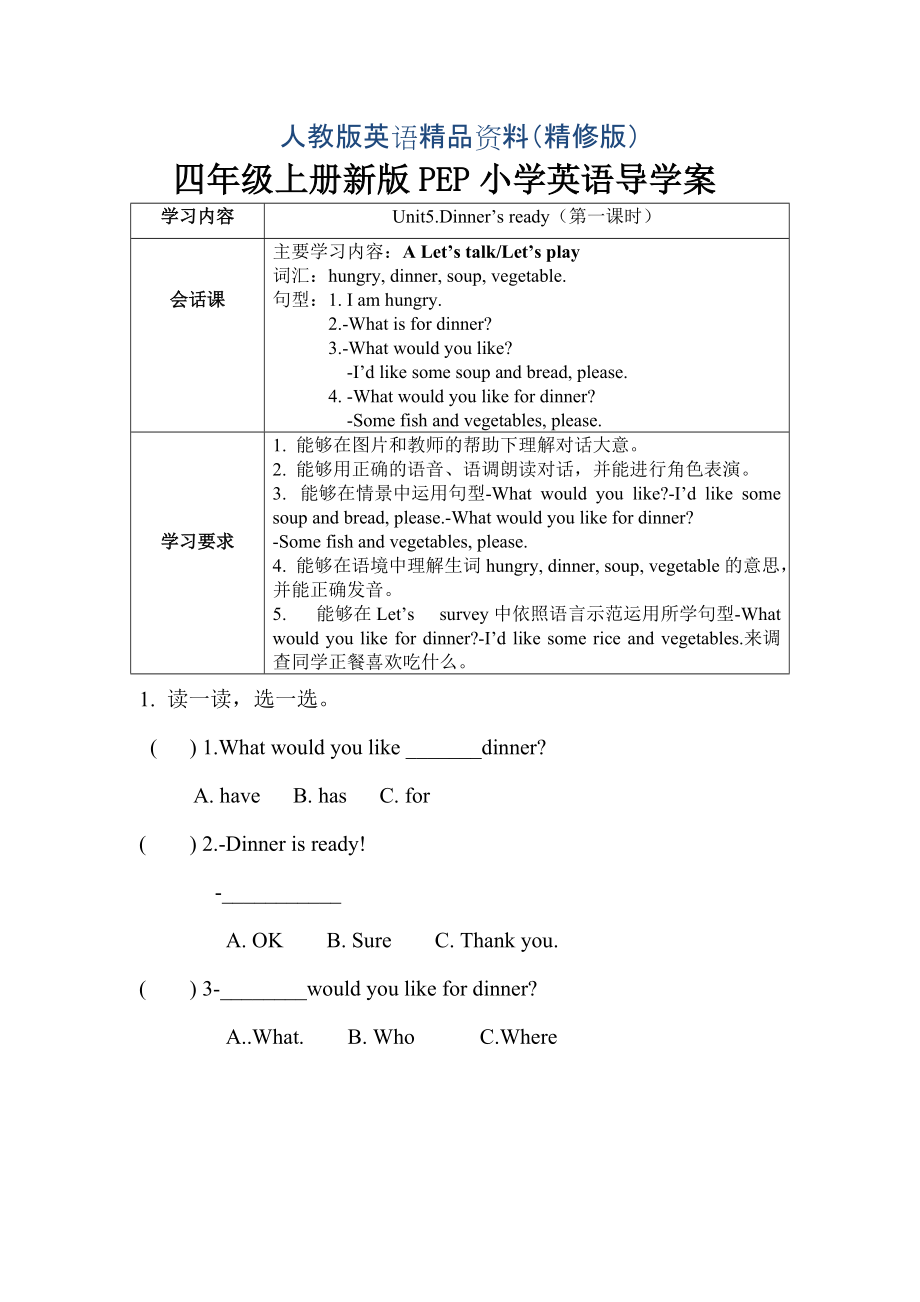《PEP小學(xué)英語(yǔ)四年級(jí)上冊(cè)Unit5單元導(dǎo)學(xué)案精修版》由會(huì)員分享��,可在線閱讀����,更多相關(guān)《PEP小學(xué)英語(yǔ)四年級(jí)上冊(cè)Unit5單元導(dǎo)學(xué)案精修版(6頁(yè)珍藏版)》請(qǐng)?jiān)谘b配圖網(wǎng)上搜索。
1�����、人教版英語(yǔ)精品資料(精修版)
四年級(jí)上冊(cè)新版PEP小學(xué)英語(yǔ)導(dǎo)學(xué)案
學(xué)習(xí)內(nèi)容
Unit5.Dinner’s ready(第一課時(shí))
會(huì)話課
主要學(xué)習(xí)內(nèi)容:A Let’s talk/Let’s play
詞匯:hungry, dinner, soup, vegetable.
句型:1. I am hungry.
2.-What is for dinner?
3.-What would you like?
-I’d like some soup and bread, please.
4. -What would you like for dinn
2、er?
-Some fish and vegetables, please.
學(xué)習(xí)要求
1. 能夠在圖片和教師的幫助下理解對(duì)話大意����。
2. 能夠用正確的語(yǔ)音、語(yǔ)調(diào)朗讀對(duì)話����,并能進(jìn)行角色表演。
3. 能夠在情景中運(yùn)用句型-What would you like?-I’d like some soup and bread, please.-What would you like for dinner?
-Some fish and vegetables, please.
4. 能夠在語(yǔ)境中理解生詞hungry, dinner, soup, vegetable的意思�,并
3、能正確發(fā)音���。
5. 能夠在Let’s survey中依照語(yǔ)言示范運(yùn)用所學(xué)句型-What would you like for dinner?-I’d like some rice and vegetables.來(lái)調(diào)查同學(xué)正餐喜歡吃什么。
1. 讀一讀�,選一選。
( ) 1.What would you like _______dinner?
A. have B. has C. for
( ) 2.-Dinner is ready!
-___________
A. OK B. Sure C. Thank you.
(
4�、 ) 3-________would you like for dinner?
A..What. B. Who C.Where
四年級(jí)上冊(cè)新版PEP小學(xué)英語(yǔ)導(dǎo)學(xué)案
學(xué)習(xí)內(nèi)容
Unit5.Dinner’s ready(第二課時(shí))
詞匯課
主要學(xué)習(xí)內(nèi)容:A Let’s learn/Let’s play
詞匯:beef, chicken, noodles, soup, vegetables, soup,.
句型: -What would you like ?
-I’d like some
5�����、vegetables, please.
-OK. Five yuan, please.
學(xué)習(xí)要求
1. 能夠聽���、說(shuō)、認(rèn)讀6個(gè)有關(guān)食物的詞beef, chicken, noodles, soup, vegetables, soup.
2. 能夠在語(yǔ)境中正確運(yùn)用這6個(gè)詞來(lái)詢問(wèn)對(duì)方喜歡吃什么�����。
3. 能夠通過(guò)Let’s play的游戲進(jìn)一步掌握-What would you like ?
-I’d like some vegetables, please. -OK. Here you are.
1通過(guò)學(xué)習(xí)Let’s learn,讓學(xué)生學(xué)會(huì)做替換練習(xí)�。
E
6、g: -What would you like ?
-I’d like some chicken, please.
-OK. Fifteen yuan, please. Here you are.
2. 讓同學(xué)們和自己一起來(lái)替換�。至少替換三組事物。
Eg:-What would you like ?
-I’d like some vegetables, please.
-OK. Five yuan, please. Here you are.
…
3.讓學(xué)生分成兩個(gè)大自然組�����,再把相應(yīng)的圖片分到學(xué)生的手里����。一方問(wèn),
7��、一方答
4.讓學(xué)生表演兩人一組的對(duì)話����,做出點(diǎn)評(píng)。
四年級(jí)上冊(cè)新版PEP小學(xué)英語(yǔ)導(dǎo)學(xué)案
學(xué)習(xí)內(nèi)容
Unit5.Dinner’s ready(第三課時(shí))
語(yǔ)音課
主要學(xué)習(xí)內(nèi)容:Let’s spell
語(yǔ)音: e /i:/ ?/e/
Read, listen and chant.
listen , circle and say.
Listen, circle and write.
學(xué)習(xí)要求
1.能夠通過(guò)聽例詞發(fā)音��,觀察例詞結(jié)構(gòu)中共有的特征���,學(xué)習(xí)e在單詞中發(fā)長(zhǎng)音/i:/的規(guī)律��;能夠跟著錄音說(shuō)唱歌謠�����,強(qiáng)化記憶e的發(fā)音規(guī)
8�、則。
2. 能夠根據(jù)e的發(fā)音規(guī)則讀出生詞�����;能夠通過(guò)對(duì)比e的發(fā)音��,強(qiáng)化e的音—形對(duì)應(yīng)關(guān)系�。
3. 能夠按照e的發(fā)音規(guī)則拼寫出單詞,進(jìn)一步學(xué)習(xí)在四線三格中正確書寫單詞���,并辨認(rèn)詞形。
1. Let’s spell. (拼一拼)觀察單詞的組成方式�����,學(xué)會(huì)記單詞�。
me he
she we
上面這組單詞有什么特點(diǎn),你注意到了嗎�����?
bed red pencil get______ let_______
9、
上面這組單詞有什么特點(diǎn)�,你注意到了嗎?
2. 我會(huì)用上面的方法記單詞�。(認(rèn)真在四線格里書寫上面的單詞)
3.
四年級(jí)上冊(cè)新版PEP小學(xué)英語(yǔ)導(dǎo)學(xué)案
學(xué)習(xí)內(nèi)容
Unit5.Dinner’s ready(第四課時(shí))
會(huì)話課
主要學(xué)習(xí)內(nèi)容:B Let’s talk/Let’s play.
詞匯:knife, fork, chopsticks.
句型:1. –Dinner’s ready! Help yourself.
-Thanks.
2.-Would you like a knife and
10、fork?
-No, thanks. I can use chopsticks.
學(xué)習(xí)要求
1. 能夠在圖片和教師的幫助下理解對(duì)話大意�����。
2. 能夠用正確的語(yǔ)音���、語(yǔ)調(diào)朗讀對(duì)話�����,并能進(jìn)行角色表演�。
3. 能夠在情景中運(yùn)用句型1. –Dinner’s ready! Help yourself.-Thanks.2.-Would you like a knife and fork? -No, thanks. I can use chopsticks. 來(lái)表達(dá)自己用餐時(shí)的需求��。
4. 能夠在語(yǔ)境中理解生詞knife, fork, cho
11�����、psticks的意思,并能正確發(fā)音����。
5. 能夠在語(yǔ)境中用-Would you like ….來(lái)提供幫助。
1. 補(bǔ)充一些中����、西方用餐的差異。讓學(xué)生了解一些餐飲文化的不同����。
如:西方的用餐喜歡用刀和餐叉,我們則用兩只筷子�,表達(dá)的是一種合作的力量。教育孩子要學(xué)會(huì)合作�。
2.學(xué)生能夠通過(guò)對(duì)Let’s play的學(xué)習(xí),理解一些關(guān)于特色菜(Today’s specials0及喜好問(wèn)句(Would you like some beef�����?)的應(yīng)用�。
四年級(jí)上冊(cè)新版PEP小學(xué)英語(yǔ)導(dǎo)學(xué)案
學(xué)習(xí)內(nèi)容
Unit5.Dinner’s ready(第五課時(shí))
詞匯課
12����、
主要學(xué)習(xí)內(nèi)容:B Let’s learn/Let’s do.
詞匯:bowl, chopsticks, fork, knife, spoon.
句型:-Would you like some beef?
-Yes, please. And pass me the knife and fork please.
學(xué)習(xí)要求
1. 能夠聽、說(shuō)�、認(rèn)讀5個(gè)有關(guān)餐具的詞bowl, chopsticks, fork, knife, spoon.
2. 能夠在語(yǔ)境中正確運(yùn)用這5個(gè)單詞。
3. 能夠完成Let’s do����,并根據(jù)步驟描述出做水果沙拉的過(guò)程。
1. 我會(huì)說(shuō)
13�����、Make the salad
Pass me the bowl
Pass me the knife
Cut the vegetables
Use the spoon
Use the fork
Now let’s try it.
2. 我會(huì)用:
-Would you like some….?
-Yes, please.
四年級(jí)上冊(cè)新版PEP小學(xué)英語(yǔ)導(dǎo)學(xué)案
學(xué)習(xí)內(nèi)容
Unit5.Dinner’s ready(第六課時(shí))
讀寫課
主要學(xué)習(xí)內(nèi)容:
Read and tick.
Tick the pictures you read abou
14�、t in the talk.
Look , choose and write。
學(xué)習(xí)要求
1. 能夠在圖片及所學(xué)知識(shí)的幫助下讀懂小短文并把相應(yīng)物品畫到相應(yīng)的位置上����。
2. 能夠在圖片的幫助下從所給詞匯中正確選填出涉及到的單詞,完成句子��;能夠根據(jù)實(shí)際情況正確寫在四線格內(nèi)��,完成句子�����。
3. 檢測(cè)部分要求學(xué)生能夠熟練地聽�、說(shuō)本單元對(duì)話部分的主要句型��;能夠聽���、說(shuō)、認(rèn)讀詞匯部分的所有單詞�����。
4. 能夠?qū)W會(huì)唱歌曲What would you like?
1.仔細(xì)看43頁(yè)圖畫����,把句子補(bǔ)充完整。
I’d like some________________, ___________and some
-What would you like for dinner?
-I’d like some ������_______________________________________________.
2.讓學(xué)生學(xué)唱歌曲What would you like?借此機(jī)會(huì)�,教育孩子們不要偏食,要營(yíng)養(yǎng)均衡才能學(xué)得好����。
 PEP小學(xué)英語(yǔ)四年級(jí)上冊(cè)Unit5單元導(dǎo)學(xué)案精修版
PEP小學(xué)英語(yǔ)四年級(jí)上冊(cè)Unit5單元導(dǎo)學(xué)案精修版

